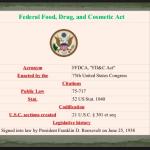In its international edition on April 25, the New York Times ran a blatantly anti-Semitic political cartoon that portrayed a blind President Trump wearing a yarmulke being led by Israeli Prime Minister Benjamin Netanyahu, who wa
New York Times
A recent New York Times editorial "Cosmetics Safety Needs a Makeover" calls for better FDA regula
The New York Times editorial board who is content in the belief that they are “the newspaper of record” wrote in an on-going series on women's rights on the “bad science and a moral panic” behind the
The Gray Lady has gotten raunchy in her old age.
It's often helpful for journalists who do not have specialized knowledge of complex scientific topics to write about them anyway, because if they can understand them and figure out how to communicate them, they can perform a tremendous public serv
Imagine going to the doctor's office. Noticeably absent are any modern tools -- laptops, DNA tests, X-ray scanners. He likes to do things the old-fashioned way. Medicine was better 100 years ago.
There is a somewhat tongue-in-cheek, though still quite real, phenomenon known as "Nobel Disease." For some reason, many people who have won a Nobel Prize went on to become infamous for saying and believing incredibly stupid things, some
There are many ailments that a physician can easily diagnose and
In yesterday s New York Times









